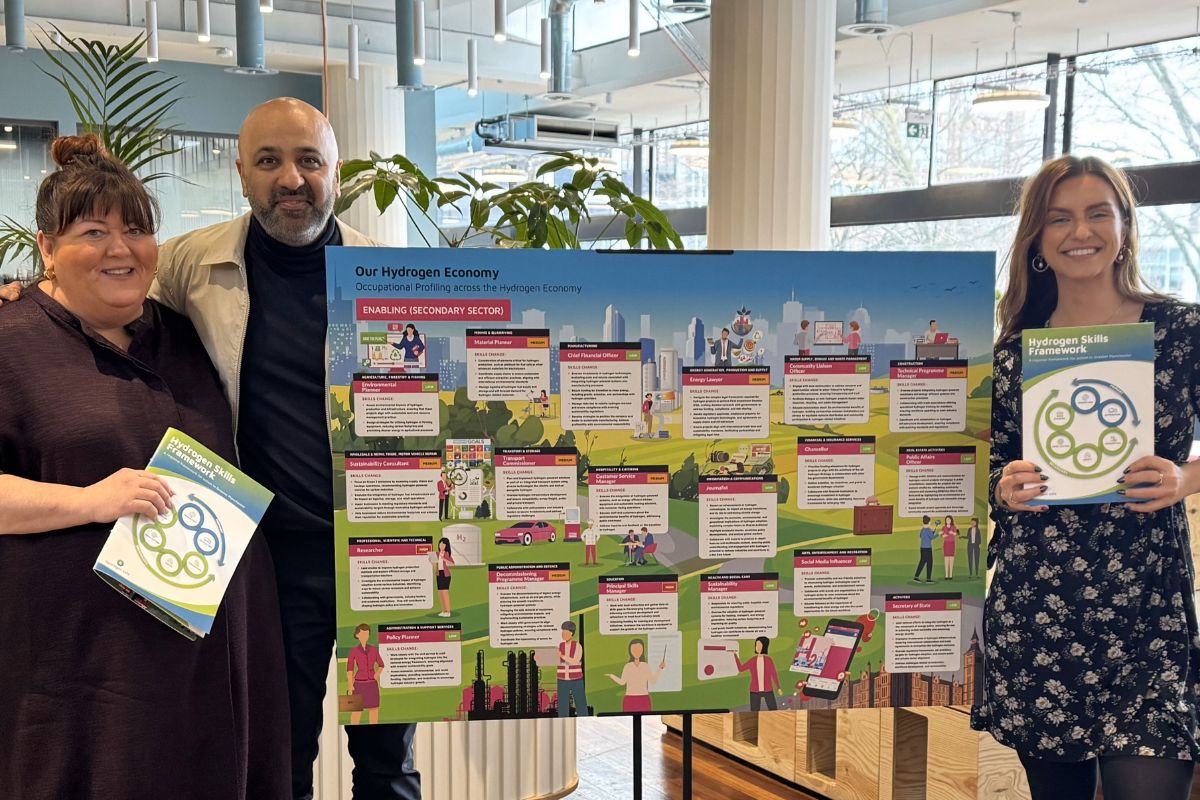AI Sector Deal – one year on

Artificial intelligence (AI) and machine learning are already transforming the global economy, using vast datasets to perform complex tasks. These range from helping doctors diagnose medical conditions such as cancer more effectively to allow people to communicate across the globe using speech recognition and translation software.
The joint government and industry AI Sector Deal is boosting the UK’s global position as a leader in developing AI and related technologies. It is taking tangible actions to advance the AI and Data Grand Challenge and ensure the UK is the leading destination for AI innovation and investment.
Today
One year after the publication of the AI Sector Deal in April 2018 last year, government and industry have already seen significant progress.
The actions to date have been focusing on building the skills, talent and leadership in the UK, promoting adoption across sectors, and ensuring AI and related technologies are used safely and ethically.
There have been important achievements across the Industrial Strategy’s 5 foundations of productivity.
AI ecosystem in the UK
- Venture capital investment into the UK’s AI sector has risen almost sixfold over the last 5 years. In 2018, AI companies raised nearly double the amount of France and Germany combined (TechNation, 2019)
- The UK has a world leading AI ecosystem, home to a third of Europe’s total AI companies and twice as many as any other European country (MMC Ventures, 2019)
- The UK ranked joint first globally in 2017 on the Open Data Barometer, a measure of how governments are publishing and using open data for accountability, innovation and social impact (Open Data Barometer, 2018)
Business environment
To create a business environment that secures the UK’s position as the best place to start and grow an AI business, we have strengthened the UK’s leadership role to keep us at the forefront of the AI and data revolution.
The AI Council has been formed to bring together respected leaders to strengthen the conversation between academia, industry, and the Public Sector with Tabitha Goldstaub as the AI Council Chair and Business Champion, and Dame Wendy Hall as the Skills Champion.
The Office for Artificial Intelligence was created as a new body within government to take responsibility for overseeing the AI and Data Grand Challenge and delivering the commitments as set out in the AI Sector Deal.
The Centre for Data Ethics and Innovation was also established to provide independent, expert advice on the measures needed to enable and ensure safe, ethical and innovative uses of AI and data-driven technologies.
Promoting UK Artificial Intelligence globally
The Alan Turing Institute, the UK’s national institute for data science and AI, signed an agreement with France’s DATAIA Institute, a convergence institute dedicated to data science, AI and society and endorsed by Université Paris-Saclay. The agreement will strengthen ties between the UK and France’s digital industries and allow for collaborative research in areas of shared interest.
The Institute also initiated agreements to collaborate with 3 major Japanese research institutes on AI and robotics research. This includes collaboration with AIST (the National Institute of Advanced Industrial Science and Technology), one of the largest research institutes in Japan focusing on bridging the gap between research ideas and commercialisation.
People
Government, academia and industry have been working together to improve the supply of skills to attract and retain the best and most diverse AI talent.
In February 2019, we announced an AI skills and talent package that includes:
- 16 new centres for doctoral training at universities across the country, delivering 1,000 new PhDs over the next 5 years
- new prestigious Turing AI fellowships to attract and retain the top AI talent
- the first wave of industry-funding for new AI Masters places
These are early steps towards building a successful, high-calibre AI workforce that is equipped to harness the opportunities of the AI and data-driven economy, now and in the future.
Infrastructure
To ensure the UK has the right digital infrastructure to support a thriving AI and data-driven economy, the Sector Deal commits to tackling the practical and cultural barriers to sharing both publicly and privately held data.
As part of this we, along with Innovate UK, partnered with the Open Data Institute (ODI) to explore a type of data sharing framework called a data trust – a legal structure that provides independent stewardship of data.
The ODI worked with 3 pilot projects each examining whether a data trust could increase access to data while retaining trust. These pilots focussed on diverse challenges: tackling illegal wildlife trade, reducing food waste, and improving public services in Greenwich. The findings and recommendations of these pilots were published in April 2019.
The work found a huge demand from private, public and third sector organisations to explore data trusts and other data stewardship models to unblock data sharing. The research focussed on the first stages of the data trust life-cycle; scoping and co-design. It found a number of different potential benefits that the data trust approach to data sharing could help to bring. These included:
- helping to balance conflicting views and incentives about how data should be shared and who can access it
- reducing costs and skills needed to steward and share data
- making control more representative over how data is used and shared and ensuring data’s benefits are distributed more widely, ethically and equitably
Place
To ensure all 4 corners of the UK benefit from the opportunities of the AI and data-driven economy we are working with key clusters to fund innovation in AI and related technologies, growing regional opportunities for AI businesses to thrive and benefit the lives of citizens.
This has included an investment of £50 million to launch 5 new centres of excellence in digital pathology and imaging with AI. These centres – based in Coventry, Glasgow, Leeds, London and Oxford – will put the UK at the forefront of the application of AI and machine learning to digital pathology and imaging, in order to support improved diagnosis and deliver precision treatments.
We announced a further investment of up to £50 million to scale-up this programme and to begin to turn the Centres into a fully national asset and deliver more efficient NHS diagnostic services. Both of these investments supports the AI and Data Grand Challenge mission to use AI, data and innovation to transform the prevention, early diagnosis and treatment of chronic diseases by 2030.
In addition to the plans for establishing new centres of excellence, £30 million of funding was received by the new Bayes Centre in Edinburgh, a world-leading centre of data science and AI to develop the next applications of AI.
Ideas
AI and data play a crucial role in our ambition to make the UK the world’s most innovative economy. This sector deal has seen immediate steps over the last year to support the adoption of AI across the public and private sectors.
We have worked with the AI consultancy, Faculty to conduct a review of AI adoption in the public sector to identify opportunities to increase productivity and service quality through the application of AI and related technologies.
In 2018, we funded £3 million for 3 new research projects to investigate how businesses can make best use of AI in insurance and law as well as analysing consumer attitudes to AI; and up to £79 million for 3 new AI programmes to transform engineering, urban planning and healthcare.
These achievements are helping us to build the best environment for developing and deploying AI and related technologies in a positive way for people and society.
Looking ahead
These achievements are only the start of the UK’s plans to be recognised as a place to start and grow an AI business, where AI and data-driven technologies follow the highest ethical standards and the transformative potential of these new technologies is spread across the UK economy more widely.
We are already building on our successes to ensure the UK remains at the forefront of the AI and data-driven economy.
By summer 2019, we will have held the first meeting of the AI Council to drive the UK’s leadership in AI, continued engaging businesses with the AI and Data Grand Challenge and maximised the ethical uptake of AI technologies across the UK.
The Centre for Data Ethics and Innovation will study the use of data in shaping people’s online experiences, and the potential for bias in decision making using algorithms as part of its first large-scale reviews. An interim report on its progress will be published in the summer.
To ensure the UK retains and attracts the best talent in AI we will support The Alan Turing Institute to deliver the first cohort of mid-career Turing AI fellows for October 2019 and launch the recruitment for the next cohort of fellows, aiming to attract the best minds in AI. We will launch the first intake of the new Industrial Masters Programme, and the first 200 AI PhDs will begin at the Centres for Doctoral Training.
We look forward to seeing the work on data trusts being taken forward following publication of the results of our world-leading data trust pilots run in partnership with the ODI. We are also considering how to use the findings from the review of AI adoption in the public sector to create opportunities to increase productivity and service quality through the application of AI and related technologies.











Responses